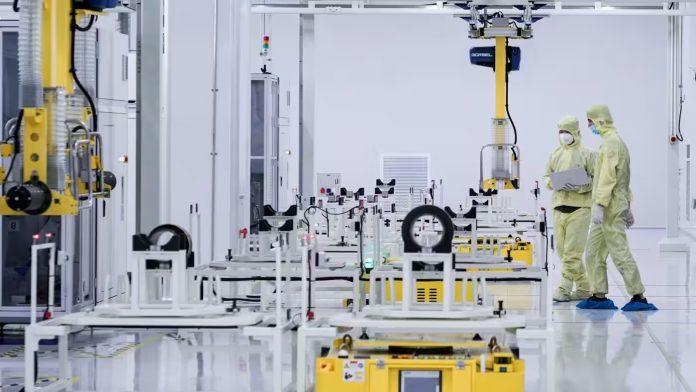Chinese makers of electric vehicle batteries are curtailing their production plans in Germany as falling EV purchases in Europe’s largest auto market hamper their sales.
SVOLT Energy Technology, spun off Chinese automaker Great Wall Motor, said last week it would halt plans to build a battery cell plant in Lauchhammer in eastern Germany’s Brandenburg state, citing what it called the “new European strategy” and the cancellation of a large customer order.
SVOLT declined to name the customer, but German public broadcaster SR reported it was BMW.
In the same statement, SVOLT cast doubt on plans to build a battery cell production factory in Ueberherrn in western Germany’s Saarland state, citing lawsuits against the project. If this also is derailed, the company will end up having built a sole factory in Germany that combines battery cells into packs and modules in nearby Heusweiler, expected to open July 1.
“At SVOLT, in addition to the already low level of planning security at various points — from the threat of international punitive tariffs to market distortions due to lengthy and unevenly distributed subsidies — a significant customer project has now also been lost,” Kai-Uwe Wollenhaupt, president of SVOLT Europe, said in a statement on Friday.
The company also said on its website, “There are the renewed discussions about the end of combustion engines in the [European Union], which have a counterproductive effect on the planned localization efforts.”
These comments were in sharp contrast to what Wollenhaupt told Nikkei Asia in 2021 when SVOLT was about to break ground on $3.2 billion worth of production facilities in Germany to serve Europe’s expanding market for new-energy cars.
“We have to get into Germany to position ourselves in the market because local-to-local production is not just a catchphrase for European automakers,” Wollenhaupt said then.
SVOLT’s backpedaling follows similar action by rival Chinese battery maker Contemporary Amperex Technology Co. Ltd. (CATL) in December.
CATL scrapped plans to expand its first cell plant outside China in the eastern German town of Arnstadt, where production began in early 2023. That decision came after Volkswagen stopped producing electric vehicles in eastern Germany’s Zwickau due to a lack of demand. Instead, CATL plans to set up a new plant in Hungary.
The rationale for Chinese companies to invest in battery production in Germany was weakened greatly by Berlin’s abrupt move in late 2023 to cancel buyers’ subsidies for EV purchases as an emergency measure to plug a fiscal hole.
As a result, the share of electric cars in all new registrations fell by 2.5 percentage points on the year in April to only 12.2%. Gasoline vehicles still had, by far, the largest share of new registrations in the country at 37.3%.
The EU will ban, effective in 2035, all new cars with combustion engines that emit carbon dioxide when driven. But a growing number of German politicians question this move.
The country’s main opposition Christian Democratic Union/Christian Social Union has launched a campaign against what it calls the “combustion engine ban” ahead of the European Parliament elections set for June 6-9.
“We manufacture the most efficient engines in the world in Germany,” Carsten Linnemann, the CDU general secretary, said in local news outlet Bild on May 23. “The combustion engine ban is damaging Germany’s prosperity and saws off the branch we are sitting on.”
While German automakers Audi, Mercedes-Benz, Opel and Volkswagen have plans to end sales of combustion-engine cars in Europe before 2035, others like BMW and Porsche are conspicuous in not having announced specific dates.
Industry observers are not surprised by the declining popularity of EVs in Germany.
“The cancellation of subsidies made several German automakers push back their plans for an end of production of combustion-powered cars, while the average consumer does not see any cost advantage in driving EVs over gas-powered cars,” said Kai-Christian Moeller, a deputy spokesperson for the Fraunhofer Battery Alliance, which represents 26 Fraunhofer Institutes conducting battery-related research and development in Germany.
For battery makers, Germany’s industrial electricity and personnel costs are considerably higher than those in eastern Europe, another reason for companies like CATL to turn to Hungary for new factories.
Another observer warned that the European Commission’s proposed punitive import tariffs on Chinese EVs may be counterproductive toward its stated aim of boosting local production. The EU thinks Beijing’s subsidies for its electric vehicle companies give them an unfair edge over European peers.
“Those tariffs would artificially increase the price of electric cars for European consumers, and I have already heard that auto parts suppliers are stopping orders for EV production and that combustion engine plants are being spruced up for a few more years,” said Ferdinand Dudenhoeffer, director of the Center for Automotive Research in Bochum.









































